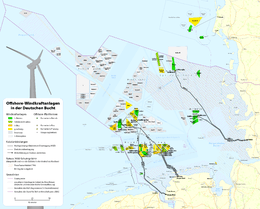Innogy Nordsee 1
| Innogy Nordsee 1-2-3 | |
|---|---|
 Location of Innogy Nordsee 1-2-3 in Germany | |
| Country | Germany |
| Location | North Sea, |
| Coordinates | 53°58′44″N 6°48′50″E / 53.979°N 6.814°ECoordinates: 53°58′44″N 6°48′50″E / 53.979°N 6.814°E |
| Commission date | 2015 (expected) |
| Construction cost | €2.8 billion |
| Owner(s) | Innogy |
| Wind farm | |
| Type | Offshore |
| Site area | 100 km2 (39 sq mi) |
| Max. water depth | 26–34 m (85–112 ft) |
| Distance from shore | 40 km (25 mi) |
| Hub height | 100 m (328 ft) |
| Rotor diameter | 126 m (413 ft) |
| Power generation | |
| Units operational | 162 X 6.15 MW |
| Make and model | REpower 6M |
| Nameplate capacity | 996 MW |

Innogy Nordsee 1-2-3 is a proposal for a large wind farm complex off Germany's coast. The planned offshore installation is to be built 40 kilometres (25 mi) north of the island of Juist, within an area of around 100 square kilometres (39 sq mi) and in water 26–34 metres (85–112 ft) deep. The project includes three wind farms: Innogy Nordsee 1 with 54 turbines, Innogy Nordsee 2 with 48 turbines, and Innogy Nordsee 3 with 60 turbines. In total, 162 wind turbines with a capacity of 6.15 megawatts (MW) will be used. The aim is to complete the wind farm in 2015 at a total investment of around €2.8 billion (US $3.72 billion).[1]
The Innogy Nordsee 1 project was originally developed by ENOVA. In 2008, it was acquired by RWE Innogy.[1] The construction permit for Innogy Nordsee 1 was issued on 4 April 2012.[2]
